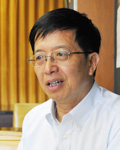|

The 1998 Asian financial crisis made China a financial giant in Asia, whereas the 2008 global financial crisis made China a financial giant in the world." This comment by C. H. Kwan, a senior fellow with the Nomura Institute of Capital Market Research, reflects the rise of China's international status. China maintained high growth in a difficult economic environment, which exceeded the expectations of the West. What was the secret to China's success? To find the answer, the focus must be directed at the relationship between the country's economy and its political mechanism, rather than on its economy alone.
If you shake off the prejudiced ideas about China's socialist political system and view it in an objective way, you'll find that it works due to the time-tested and rational choices China's social elites have made in line with the trend of this era against the country's historical and cultural background. Every country's political system has pros and cons, so it's unwise to simply judge one as superior to another. India claims that it is the largest democratic country in the world, but the caste system that makes people unequal from birth has never really vanished. In the United States, the "Occupy Wall Street" movement broke out with a slogan meant to condemn the unfair social reality of 1 percent of the population occupying 99 percent of the social wealth. In the past 30 years, China has risen to become a major economy in the world. It has helped more than 400 million people climb out of poverty, and meanwhile its social freedom and political democracy have made great headway, a monumental success that no other political system has achieved.
I have always paid attention to the political reasons for China's rise. I think China has fundamentally solved the problem of how to ensure the consistency of policies, which has confounded the Western political system for a long time. Thus, China is able to fully ensure the implementation of the "three-step" development strategy. In the West, even a three- or four-year policy is difficult to sustain due to frequent administrative changes and various political trades due to parties' pursuit of private interests. In China, however, the national development strategies are confirmed on the political level at the national Party congress, which is held every five years. The annual "Two Sessions"—the National People's Congress and the Chinese People's Political Consultative Conference—make minor adjustments to these strategies with regard to implementation. The effective mechanism can manage long-term strategy setting and implementation accordingly. In addition, China has ensured the stability and consistency of policies by introducing an age limit for cadres and limits on officials' tenure. At every stage of development, the implementation of the "three-step" strategy is made possible through the adjustment of cadre assessment criterion. This is probably only achievable under China's political system, and it is the secret that ensures the implementation of long-term strategies in different regions and departments. The performance of local governments was measured with the growth rate of GDP and the attracted investment, encouraging officials to seek out investments and build roads. Today, the new objective includes the residents' happiness index and environmental improvement, which is spurring local leaders to pay more attention to social issues and livelihood development.
In line with the basic principle of Marxism, "the superstructure is determined by the socio-economic base," China pursues the following priorities one by one: economic development, improvement of people's livelihood and social democracy, and advancement of the reform of the political system within reason. This well-balanced programming is becoming the most powerful guarantee for realizing social and political democracy.
In recent years, China has seen scores of mass activities in defense of rights in many places. Some worry that this will lead to political and social chaos. In my opinion, the phenomenon is an indication of China's social progress. With China's economic and social development, the Chinese people's sense of safeguarding their own rights has been on the rise. As a result, the political reforms being pushed forward by the government's high-level leadership are interacting with civil society. President Hu Jintao stressed at the opening ceremony of the seminar for major leading cadres at the provincial and ministerial level in late July, "We should always put political reform at a prominent position in the whole process of development...We should practice democratic election, democratic decision-making, democratic management and democratic supervision in accordance with the law, so as to ensure social justice and equality and to protect people's extensive rights and freedom in accordance with the law." Here we can see that "political reform" and "implementation of democracy" will become keywords in the coming 18th National Congress of the Communist Party of China.
After the convening of the 18th National Congress of the Party, the focus of political reform will be transferred to the formulation of democratic mechanisms in various aspects. In the interaction with public opinion, the Party will bravely face up to and solve problems that trigger the public's dissatisfaction, particularly in the political and social areas.
From a macro perspective, the political reform intending to push forward inner-Party democracy and democracy at the grassroots level has never ceased. The 18th National Congress of the Party will advance the integration of these dynamics. We can expect to see a new era of overall political, social and economic reform from top to bottom within China in the coming decade.
The author is a professor with Tokyo Gakuen University, a representative of the Society of Chinese Professors, and director of the NPO China-Japan Academic Exchange Center
Dear Readers,
"Forum" is a column that provides a space for varying perspectives on contemporary Chinese society. We invite you to submit personal viewpoints on past and current topics (in either English or Chinese).
E-mail us at: zanjifan@bjreview.com
Please provide your name and address along with your comments. |
